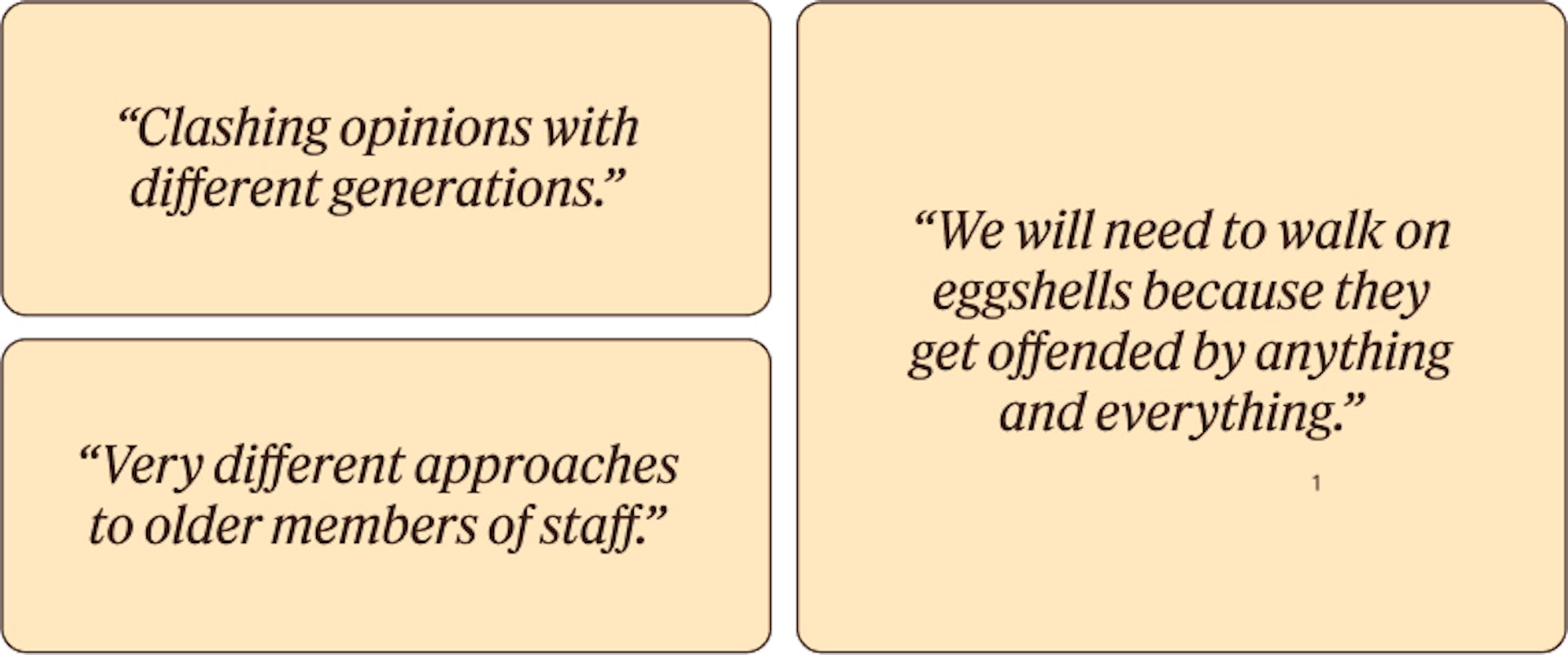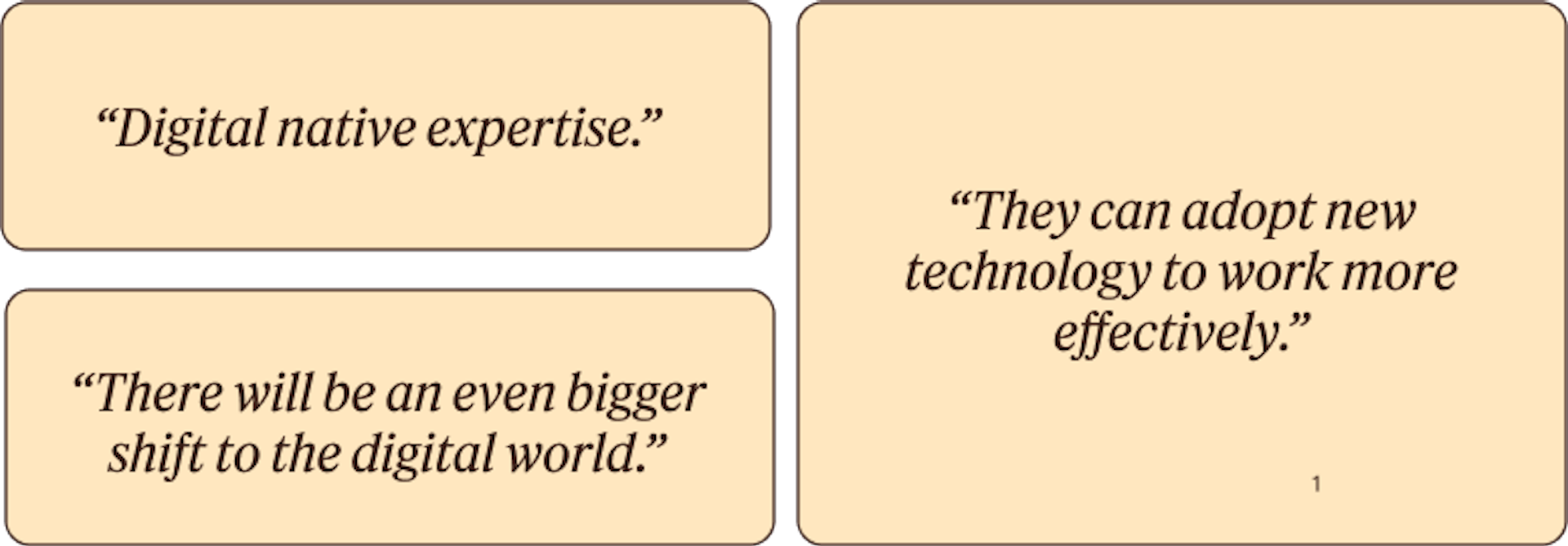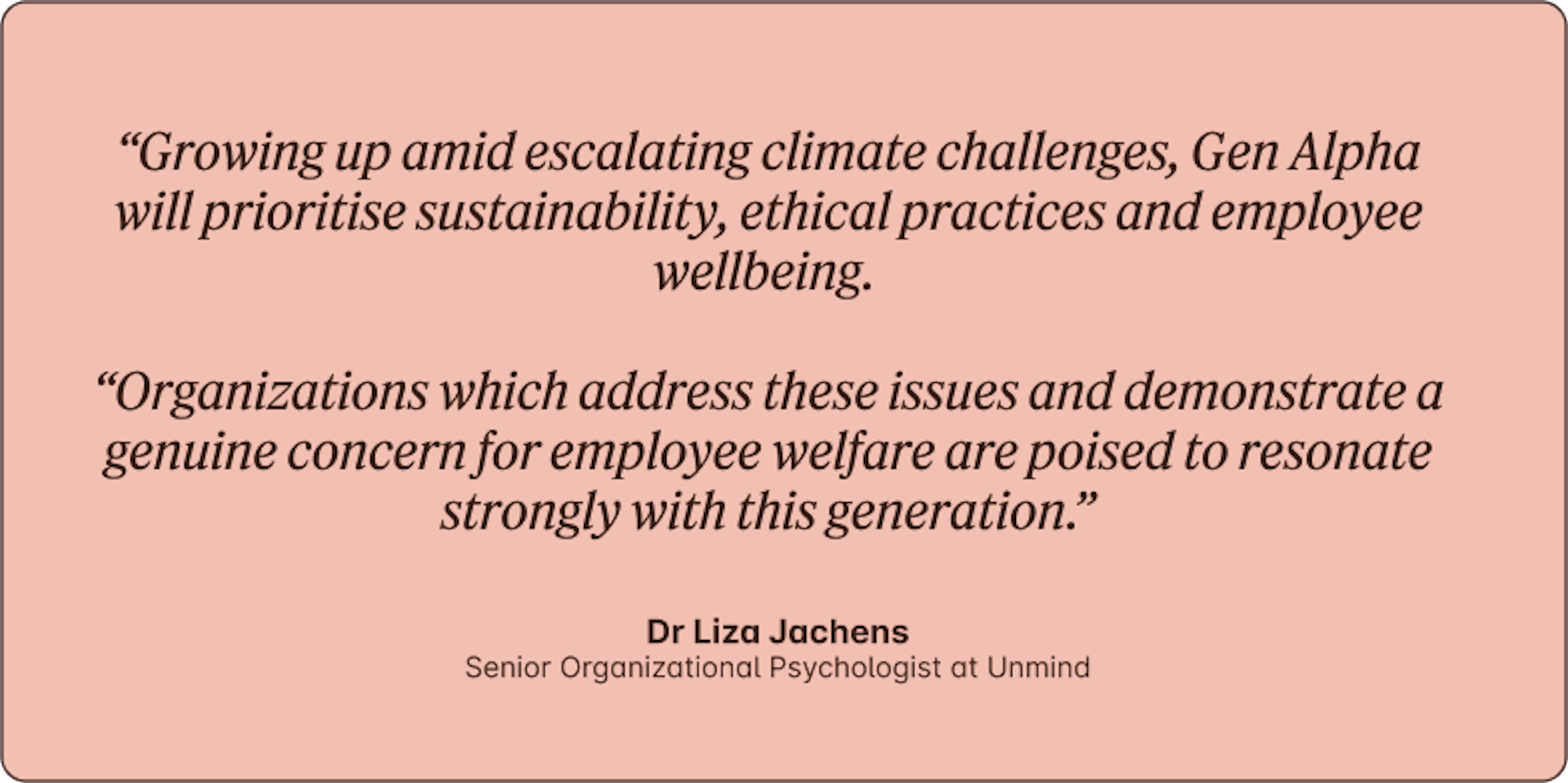Are the kids alright? Generation Alpha and the next wave of change for work

Dr. Jazz Croft
28 February 2024

Content
- Pass the avocado, mind the eggshells
- How generational labels change how we think
- What we know about younger employees
- Opportunities for the future workplace
- Gen Alpha’s imperative for innovative workplaces
Generation Alpha (born between 2013–2024) may be a while off their first job, but Unmind’s new HR 2030 report which surveyed over 3,625 people leaders shows that industries are already anticipating what changes they will bring to the workforce.
Whether it’s engaging with tech, talking about mental health or demanding more from employers, our findings reveal how leaders feel about younger employees today and Gen Alpha’s slightly older cousins, Gen Z (born between 1997–2012).
These changes also bring anxieties. Nearly a third of leaders in our survey think that Generation Alpha entering the workforce will lead to workplace clashes due to generational differences in values, expectations and communication styles.
But how well-founded are these differences between age groups? Here, we sort fact from fiction on why we seem so preoccupied with generational differences, what research can tell us about mental health for younger workers and what this really means for the future of work.
Pass the avocado, mind the eggshells
Whether it’s dismissing baby boomers as socially conservative or chastising millennials for an avocado toast addiction, every generation has its very own popular culture stereotypes. And these attitudes can filter through how we approach, interact and interpret others at work.
In our survey, we saw these tensions in our responses. When asked about the biggest challenges around Gen A joining the workplace, some respondents focused on the different values and attitudes as the biggest concern.
Q: What are the biggest challenges for Gen Alpha entering the workforce?

How generational labels change how we think
With the eldest Gen Alpha still in elementary or primary school, it’s striking that some leaders are already expecting their perspective to be a cause of conflict as part of the change they’ll bring to work.
One psychological reason for these concerns can be in/out-group biases. In social experiments, dividing people into groups makes people report biased views in favour of their own group (‘in’ group) and builds negative perceptions of outside groups (‘out’ groups).
By this logic, it’s easy to play to reductive stereotypes and ‘otherise’ generations we don’t belong to. With a more considered approach, we can examine the real differences between generations at work rather than harmful in/out-group thinking.
What we know about younger employees
Looking back over the past years, we know that age influenced our experience of the Covid-19 pandemic in crucially different ways.
While older generations were at greater risk of health complications from contracting the virus, younger people faced significant social disruption in their formative years. This included less direct contact with people, greater job insecurity, and challenges in building relationships and planning for the future.
And the mental health consequences don’t make for easy reading. Gen Z is experiencing the highest levels of loneliness out of any age group; two-thirds meet WHO criteria for burnout and, heart-breakingly, 45% don’t expect to be as successful as generations before them.
But there are also signs of hope. In a study of post-Covid values and attitudes, Gen Z participants were more open to change and self-enhancement, including positive attitudes towards online learning, compared to older generations.
Greater openness to change is a promising sign that young people are building proactive values to help cope with uncertainty and support their growth in times of crises.

Opportunities for the future workplace

Response from a HR leader who participated in our HR 2030 Trends report
Despite fears of generational clashes, our survey reflected optimism about how Gen Alpha will demand change that can benefit all of us.
These opportunities fall into two key domains: greater support for mental health at work and embracing rapid technological change.

Meeting the demand for workplace mental health
While we’ve seen greater emphasis on mental health by employers, there’s still a long way to go to achieve high standards of support for the workforce.

In a survey of Gen Z workers, nearly a third said they didn’t feel comfortable discussing mental health with their manager, and half of the cohort who took time off due to poor mental health didn’t disclose the real reason.
With a greater expectation of mental health support from organizations, addressing poor practices and stigma is a critical step for preparing your workplace to attract, engage and retain future talent.
Embracing tech
Alongside increased demand for mental health investment, 38% of leaders expect Gen Alpha will meet the increased demand for digital skills and bring tech talent to the workplace.
Q: What is the single biggest change Gen Alpha will bring to the working world?

With younger generations born into a digital world, their role as ‘digital natives’ leading the way for tech in the workplace feels like a no-brainer. But across generations, we’ve all integrated rapid technological change into our working lives through hybrid working practices, communication tools and the growing role of AI at work.
Perhaps looking to younger people for tech innovation is overlooking our own capacity for growth and development.
Gen Alpha’s imperative for innovative workplaces
This raises the question, do we have to look to young people to bring the progress that we expect to see in the next ten years?
While young professionals will vote with their feet by choosing employers based on the support and innovation they offer, it will be up to senior leaders from previous generations to make these changes happen.

As leading generations researcher Professor Bobby Duffy highlights, despite divisive messaging and cultural stereotypes, it’s people working across generations that advocate and achieve social change.
With this in mind, all leaders are empowered to innovate and champion mental health for the benefit of the workforce. By the end of the decade, the most innovative leaders may have already made the progress needed for Gen Alpha to thrive.
Download our HR 2030 Trends report to discover:
- The three trends that will define HR’s success or failure.
- How to become a strategic business partner to the C-suite.
- Your one-year, three-year and six-year HR transformation plan.
About the Author

Dr. Jazz Croft, Senior Scientific Liaison
About the Author
